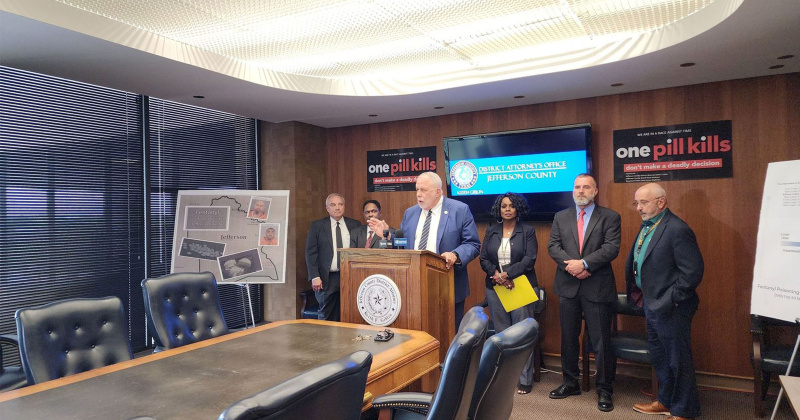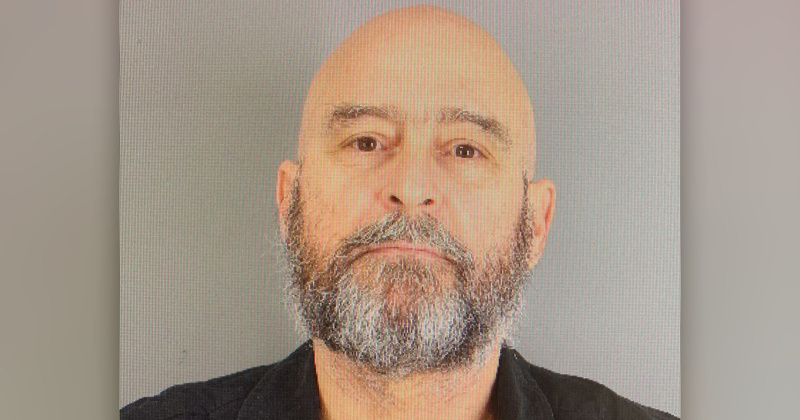April 24, Jefferson County District Attorney Keith Giblin and members of local and national law enforcement held a press conference announcing the prosecution of two criminal defendants charged with murder and manslaughter related to the deaths of three individuals who overdosed on fentanyl.
A Jefferson County grand jury met the same day, issuing indictments for Harry Francis Lowenthal and Dalton Batiste on charges of manslaughter and murder, respectively.
Lowenthal was indicted for manslaughter in the death of John Marion Janice, who was provided heroin tainted with fentanyl, Giblin said.
A month prior, on March 25, Lowenthal pled guilty to possession with the intent to distribute a controlled substance, fentanyl, before U.S. District Judge Marcia Crone. The court accepted his plea but deferred acceptance of a plea agreement at the time.
Batiste was indicted on two counts of murder for the deaths of Aaron Sanchez and Matthew Kreiss in January. Beaumont Police Department responded to a home on Tyler Street in the north end of Beaumont on Jan. 10, where firefighters and medics were working on multiple unresponsive men. Although officers administered Narcan to two of the three suspected victims at the time, Sanchez and Kreiss did not survive.
“Aaron and Matthew were good men who worked for local companies,” Giblin said. “Matthew had graduated from A&M and was working as a project manager and he had been married for 52 days. Aaron was a good man and dedicated father with a bright future. They died after ingesting what they thought were harmless pills provided by Batiste.”
The murder charge is the first of its kind in Jefferson County following the change of state law in September of last year.
“They’re killing our children, and I can’t put it any more bluntly,” Giblin said. “Drug dealers are killing our children.
“Not too long ago, the cartels realized that good, hardworking Americans were addicted to painkillers, so they changed their business model and started moving away from cocaine and marijuana and started trafficking illegal opioids such as counterfeit oxycodone and counterfeit hydrocodone. Business was good and they realized they could use their pill presses to make counterfeit Xanax and Adderall and these pills look identical to what’s being sold in a pharmacy.”
Giblin said dealers went even further, deciding to take fentanyl, which is 50 times stronger than heroin and 100 times stronger than morphine, and mix it with counterfeit pills to increase strength and cravings.
“Ten to 15 grains of fentanyl make it a deadly dose,” so if they over-sprinkle, it kills their customer almost instantaneously,” according to Giblin. “They consider this just the cost of doing business...they don’t care.”
According to DEA statistics, 6 out of 10 pills recovered on the street contain fentanyl, and drug overdose is now the leading cause of death of people between the ages of 18 and 35. Statistics show Jefferson County is the third leading county in the state behind Harris and Bexar counties in fentanyl-related deaths.
Texas Department of State Health Services data reveals a surge in fentanyl poisoning-related fatalities within the state. In 2023 alone, Texas grappled with 2,152 deaths linked to fentanyl poisoning, constituting over 45% of all drugrelated fatalities reported throughout the year. This data underscores a trend that has been steadily escalating since 2014, with a marked upswing observed particularly from 2020 onward.
“Fentanyl is killing college students who are suffering from a football injury and took one pain pill given to them by a teammate … it’s killing high school kids who bought an Adderall on Snapchat so that they could concentrate and study for a test … it’s killing junior high school kids who self-medicated and took a Xanax for anxiety … good kids who had a future and kids who have people who love them,” said Giblin.
Giblin stated that a neighboring county high school recorded 15 fentanyl poisonings on campus, where students were administered Narcan and survived.
“We’ve had enough, we need to do something about it, and we are doing something about it,” said Giblin.
In response to the escalating fentanyl crisis, Texas legislators passed House Bill 6 on Sept. 1, 2023. This legislation introduced measures aimed at addressing the proliferation of fentanyl and its deadly consequences. House Bill 6 also established the criminal offense of murder for individuals found guilty of supplying fentanyl that leads to a fatal outcome. Moreover, the bill implemented stricter penalties for the manufacturing and distribution of fentanyl, aiming to deter illicit activities contributing to the epidemic.
Under the provisions of House Bill 6, the manufacturing or delivery of fentanyl resulting in an overdose death is classified as a first-degree felony, carrying a sentence of 5 to 99 years or life imprisonment. Furthermore, the legislation delineates penalties based on the quantity of fentanyl involved, with escalating punishments for larger quantities. For instance, manufacturing or delivering fentanyl ranging from 200 to 400 grams is punishable by 10 years to life imprisonment, along with a maximum fine of $100,000. The penalties become even more severe for quantities exceeding 400 grams, attracting a sentence of 15 years to life imprisonment and a maximum fine of $250,000.
Additionally, House Bill 6 mandates that deaths attributable to fentanyl must be classified as fentanyl toxicity or fentanyl poisoning on death certificates, aiming to provide more accurate data regarding the scope of the crisis. This requirement marks a departure from previous practices, where most fentanylrelated deaths were classified simply as overdoses.
Locally, law enforcement continues to increase its efforts to educate children and young adults alike about the dangers of fentanyl. The “One Pill Can Kill” campaign is noted for reaching more than 4,000 students in the region in a single week alone as law enforcement officers continue their efforts to educate the masses.
“We want to make it crystal clear that if a person in this county dies of an overdose related to a fentanyl-laced drug, there will be a murder investigation – I can guarantee that. These men and women will work tirelessly to determine who supplied those pills and this office will prosecute that person for murder and put them in jail for the rest of their life.”




